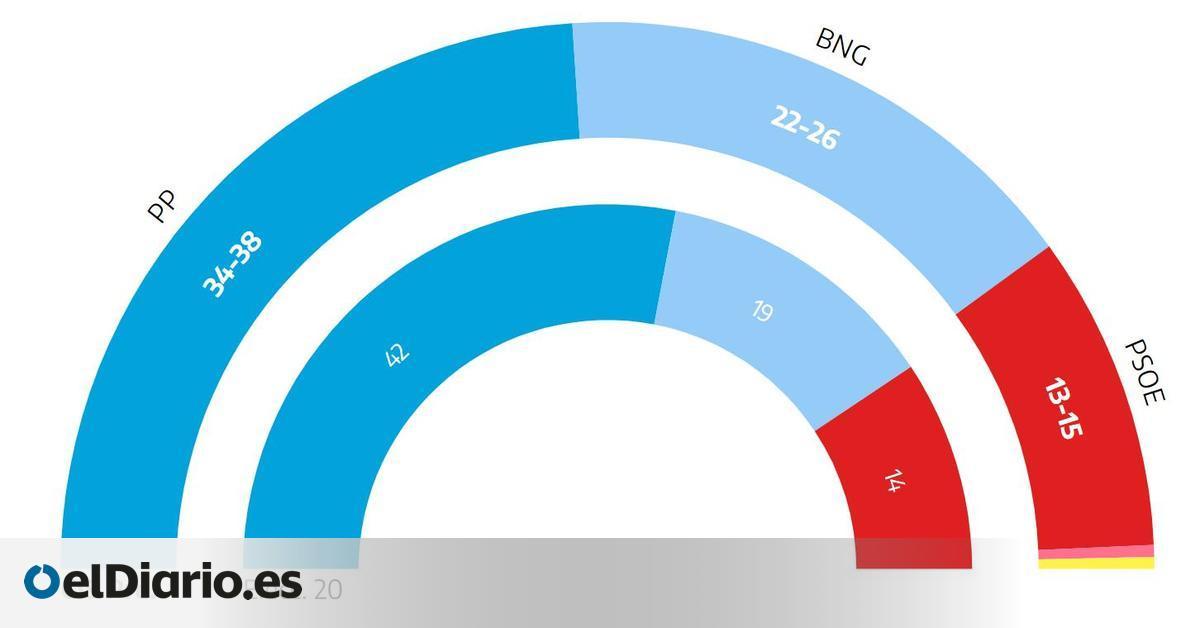
Elections in Galicia (18F)
CIS flash pre-election survey. Majority in 38 seats
The stage for the February 18 elections in Galicia opens. The Center for Sociological Research (CIS) predicts a turnaround. It places Alfonso Rueda’s PP as the most voted force, with 42.2% of the votes and between 34 and 38 deputies, a sharp decrease compared to the 42 that Alberto Núñez Feijóo achieved in the 2020 regional elections. It is a figure that leaves open the possibility that it loses its absolute majority, which in the Galician Parliament is precisely 38, and that a left-wing government is formed in the Xunta after 15 years of domination by the popular ones.
The survey presents a scenario in which the BNG soars and breaks its electoral ceiling, with the possibility of achieving 32.9% of the votes and between 22 and 26 seats – compared to the 19 it obtained in 2020, its maximum number of deputies. , although not in votes. The calculation for the PSdeG-PSOE is that it will obtain 20.1% of the votes and will obtain between 13 and 15 seats – now it has 14 -. The photograph is completed with the possible entry of two forces that currently do not have representation in the Galician Chamber: Sumar can obtain one seat and Democracia Ourensana could obtain another. With this distribution, a left-wing government would be possible that would lead the nationalist formation.
The institute directed by José Félix Tezanos continues to predict that Vox remains out of the Galician Parliament. Podemos would find itself in the same situation, which would not be able, according to this survey, to sit in the Autonomous Chamber. For the statistical work, 3,743 interviews were carried out between January 29 and February 1, that is, just before the electoral campaign started.
The most valued candidate continues to be Ana Pontón (BNG) with 5.74, ahead of the PP candidate, Alfonso Rueda, who obtains 5.37. They are followed by Xosé Ramón Gómez Besteiro (PSdeG), with a 4.86, and Marta Lois (Sumar), with a 3.98.
With these results, the left-wing options in Galicia (including BNG, PSdeG, Sumar and Podemos in this group) would add up to 55.4% of the votes. Opposite, the PP and Vox would reach 43.1%.
The CIS survey also reflects that a large part of the electorate is undecided: 27.7% say they do not yet know which option they are going to vote for. And 11.6% of voters leave the decision for the reflection day (5.5%) or the day of the vote itself (6.1%). In total, between those who decide at the last moment and those who do so during the campaign, they are 44.3% of the voters.
Regarding the transfer of votes, those who decided in 2020 on the PP ballot are the ones who remain most faithful, according to the CIS: almost 87% of them assure that they will vote again for this formation, which will also include voters who They opted for VOX and Ciudadanos four years ago.
The BNG will once again be the choice for 84% of those who already voted for it in 2020. The nationalist organization will also receive support from those who had then opted for Galicia en Común and Marea Galeguista, two forces born from the pacts of the sovereignist space and the left. federal and that in the previous elections they were left without representation. There will also be a transfer of these two spaces to Sumar (26.9% of those who said they had supported Galicia en Común and 27.1% of those who said they had voted for Marea Galeguista).
Source: www.eldiario.es

